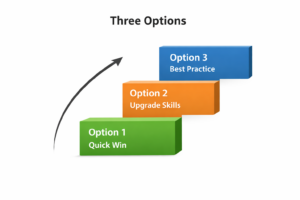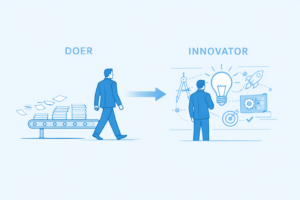Ah, the 1990s. A time of dial-up modems, floppy disks, and that one friend who would argue that The Matrix was a documentary. But perhaps the most striking thing about the late 90s wasn’t the fashion (although, let’s be honest, we’re all trying to forget some of those outfits). No, what really stands out now is just how many people believed that the internet was a passing fad, a technological sideshow destined for the bin alongside Betamax and laserdiscs.
Looking back now, those predictions seem hilariously off the mark. The internet didn’t just “take off” – it soared into many aspects of our daily lives and transformed every industry it touched. Yet, here we are in 2024, and we’re hearing very similar scepticism about artificial intelligence (AI). Haven’t we learned anything from the 90s? Let’s take a stroll down memory lane and explore what people said about the internet back then and why they’re just as wrong about AI today.
1. “It’s a Fad!”
In the late 90s, people said, “The internet is just a phase. It’ll die down once the novelty wears off.” Fast-forward to today, and we can’t even imagine life without it. If the internet is a fad, it’s the longest-running fad in human history. Yet, strangely, this same sentiment is being applied to AI: “It’s just hype. The bubble will burst!”
Well, let me tell you: AI is no Beanie Baby. Just as the internet became integral to communication, business, and our social lives, AI is quietly embedding itself into the fabric of modern life. Every time you ask Siri for directions, browse Netflix’s recommendations, or shop online, AI is working behind the scenes. Fads don’t automate entire industries. They don’t streamline healthcare, transform manufacturing, or shape the future of education. If AI’s a fad, then it’s shaping up to be another one of those “forever fads,” just like the internet.
2. “There’s No Practical Use for It”
Ah, this old chestnut. Back in the day, critics argued that the internet was a toy for geeks and academics — good for sharing a few cat pictures, but useless for serious, real-world applications. They failed to predict the rise of e-commerce, social media, and video streaming, which now dominate our daily routines.
Today, the same argument is wheeled out against AI: “It’s interesting, but it’s not useful for everyday tasks.” Tell that to the businesses already using AI to optimise their supply chains, the doctors diagnosing diseases with AI-powered tools, or the lawyers using AI to review contracts in seconds. AI isn’t just useful – it’s becoming essential. The internet brought convenience and connection, AI is delivering intelligence and efficiency.
3. “Too Risky for Established Businesses”
In the late 90s, the world’s biggest companies were slow to jump on the internet bandwagon. CEOs were hesitant to shift resources online, fearing that it would cannibalise their traditional revenue streams or disrupt their core businesses. Remember Kodak? They famously failed to embrace digital photography, and we all know how that story ended.
Fast-forward to 2024, and some businesses are making the same mistake with AI. They see it as too risky, too disruptive. But just like the companies that resisted the internet, those that ignore AI now are setting themselves up for irrelevance. Early adopters of AI aren’t gambling – they’re investing in the future. Much like how Amazon, Google, and Apple reaped the rewards of embracing the internet early on, today’s businesses need to be at the forefront of AI innovation or risk being left behind. The real risk is in not adopting AI.
4. “No Clear Revenue Model”
Once upon a time, people looked at the internet and said, “How is anyone going to make money from this?” The dot-com bubble didn’t help matters, but as we now know, the internet revolutionised business models. E-commerce, subscription services, online advertising – all of these would have seemed outlandish in 1999, but they now underpin much of the global economy.
Similarly, AI sceptics today argue that there’s no clear way to generate consistent revenue from AI technologies. But just like the internet in its early days, AI’s full potential is still unfolding. AI-powered services are already helping businesses reduce costs, improve efficiency, and drive innovation. Companies are finding new ways to monetise AI every day, from personalised marketing to predictive analytics. The revenue model will evolve, just as it did for the internet, and the returns will be enormous.
5. “Limited Market Reach”
In the 90s, many believed the internet would only be relevant to tech enthusiasts or maybe just a few high-tech industries. People thought the average consumer wouldn’t need it or wouldn’t be able to use it effectively. Today, we’re all glued to the web, from toddlers watching YouTube to grandparents shopping on Amazon.
AI is currently facing the same argument. “It’s only for tech companies,” they say, or “It’s not applicable to my industry.” But AI, like the internet before it, will reach everyone. Whether it’s improving crop yields in agriculture, making better financial predictions in banking, or enhancing customer service in retail, AI is a horizontal technology – it’s relevant to every industry. You don’t need to be a tech giant to benefit from AI. In fact, much like the internet, AI will likely make the biggest impact on those industries that seem farthest removed from technology today.
6. “It Will Never Replace Physical Retail”
Oh, the 90s optimism for physical retail! The internet was never going to replace bricks-and-mortar stores, they said. People liked to see and touch products before buying them. Fast forward to today, and online shopping is a multi-trillion-pound industry. Not only has it replaced a chunk of retail, but it’s also transformed it, forcing physical stores to adapt or close.
The same doomsayers are now wagging their fingers at AI, claiming it won’t replace or significantly change current systems. But AI isn’t about replacing everything – it’s about augmenting and enhancing what already exists. In retail, AI is already improving inventory management, personalising customer experiences, and predicting consumer demand. The question isn’t whether AI will disrupt business; it’s how soon.
7. “Too Much Competition”
During the dot-com boom, critics argued that the internet made it too easy for new competitors to emerge. The barrier to entry was low, and anyone with a website could set up shop, leading to a crowded marketplace. This same concern is now being voiced about AI – that it will create too much competition and level the playing field in a way that hurts established businesses.
Here’s the twist: competition is good. The internet democratised business, enabling start-ups to compete with established giants. AI will do the same, but businesses that are quick to adapt will maintain a competitive edge. AI gives companies the tools to be more efficient, more innovative, and more responsive to customer needs. Those who embrace it early will outpace their rivals, just as Amazon and Google did during the internet age.
8. “No Tangible ROI for AI Investment”
In the 90s, companies were hesitant to invest in building websites or e-commerce platforms because the return on investment wasn’t immediately clear. Today, businesses know that an online presence is essential, and the ROI is beyond question.
Now, the same uncertainty surrounds AI. Businesses are hesitant to invest because they’re unsure if they’ll see immediate returns. But as with the internet, the payoff comes with time. AI is already delivering ROI in sectors like healthcare, where it’s speeding up diagnoses, and in finance, where it’s optimising trading strategies. AI’s impact may not be instantaneous, but as it matures, it will deliver massive returns.
9. “It’s Too Impersonal for Business”
Back in the 90s, some business leaders argued that the internet was too impersonal for meaningful customer interactions. They believed that people would always prefer to conduct business face-to-face. But we all know how that turned out: online interactions have become the norm, from customer support to social media engagement.
Today, some say AI is too impersonal – that chatbots and automated systems will alienate customers. But the truth is, AI is enhancing personalisation, not eliminating it. AI-powered systems can deliver tailored recommendations, answer customer queries in real-time, and predict customer needs with greater accuracy than human agents ever could. Far from being impersonal, AI is helping businesses build stronger, more personalised relationships with their customers.
10. “Security Concerns”
Finally, let’s talk about security. In the 90s, the internet was viewed as a Wild West of security threats, and many businesses were reluctant to put their data online. These fears weren’t entirely unfounded – cybercrime is still a serious issue – but as we’ve developed better security protocols, encryption, and cyber-defence strategies, the internet has become far safer.
The same concerns are now being voiced about AI. People worry about data privacy, AI-driven cyberattacks, and the misuse of AI technologies. But just as with the internet, we will develop the regulations, standards, and technologies needed to ensure that AI is secure and trustworthy. Security concerns should be a reason to improve AI, not to abandon it.
Conclusion: AI is Not the New Internet – It’s the Next Step
In the 90s, we underestimated the internet because we couldn’t see the full picture. It was new, unfamiliar, and full of potential we couldn’t yet imagine. Today, AI finds itself in the same position, and the same scepticism that surrounded the internet is rearing its head again. But here’s the thing: we’ve seen this film before, and we know how it ends. AI, like the internet before it, is here to stay – and it’s going to change everything. So, let’s not make the same mistakes twice. Embrace AI, and who knows? You might just be the next Amazon.






